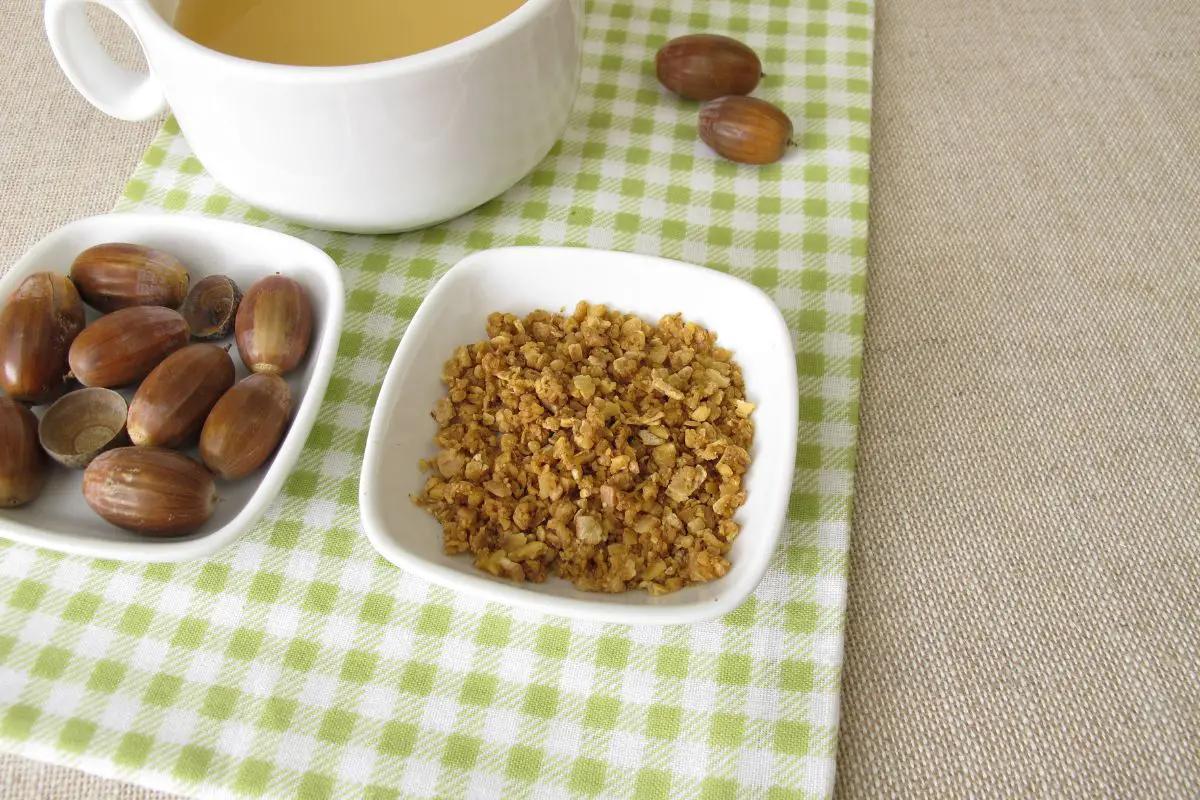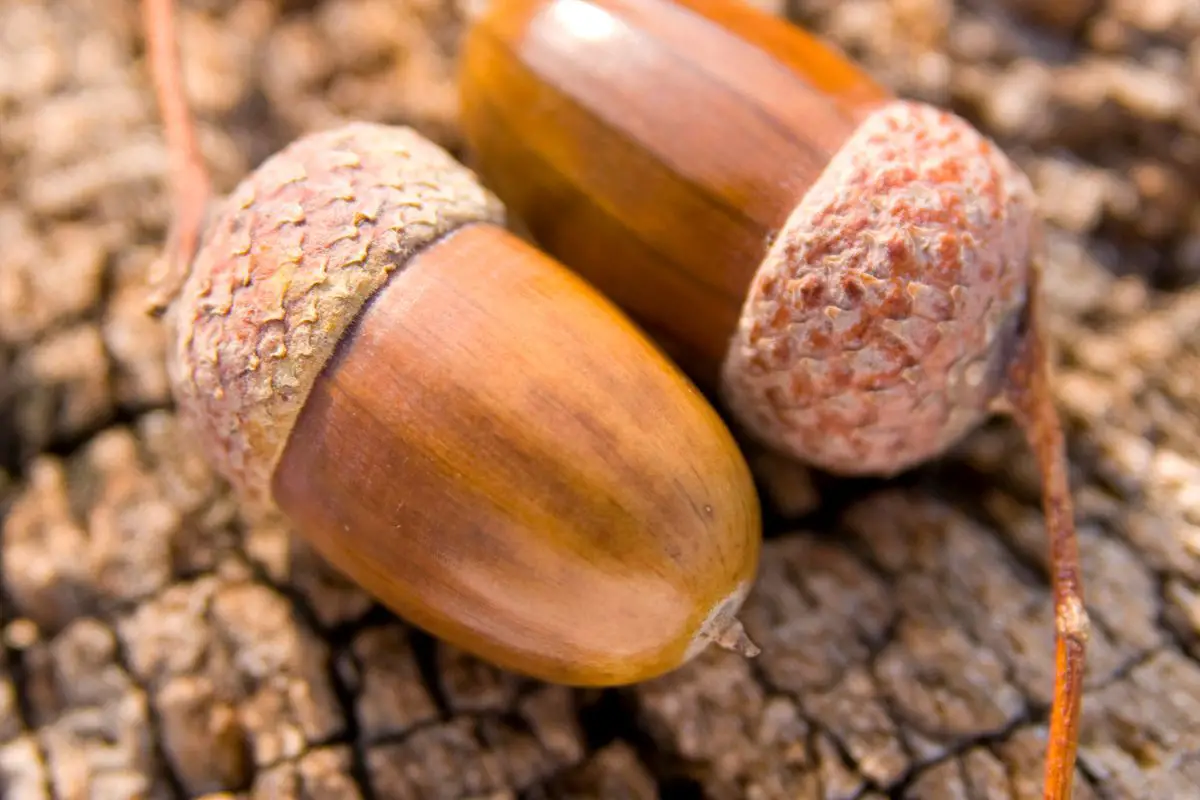Coffee’s recognition as one of the most popular beverages in the world has come to stay. Not only is it popular, but it also has a myriad of health benefits. However, not everyone can afford coffee, both financially and health-wise. These sets of people try to look for other beverage alternatives to meet up with coffee drinkers.

There are different types of coffee substitutes around the world. Examples of these substitutes are; chicory root, roasted cereal grain, and Acorn.
This article shall focus on Acorn coffee. What is the story behind using acorns to make coffee? How is it done? What are the benefits, if there are any?
Acorn
Acorn is a fruit of an oak tree. It is one of the most critical wildlife foods where oaks grow. The time they mature depends on the species, ranging between 6 and 24 months. This nut often has a single seed enclosed in its rugged, leathery shell.
Birds, small mammals, and some big mammals feed on acorns, but the tannins are poisonous to other animals, like horses. However, you can get rid of the tannins with water.
Acorn coffee history can be traced back to the 17th century when Europe had no coffee beans. They improvised and used acorns that they had in abundance. During the American civil war, soldiers used ground acorns to substitute for their coffee.
Uses of Acorn
Acorn is helpful in a lot of ways. It can be eaten whole or ground up into acorn flour for bread, pastries, pancakes, cookies, and pasta. Acorn can also be made into mush and get the oil extracted.
Different uses of acorns require other preparation methods, such as leaching the tannins with cold or hot water and sprinkling with salt.
How to Make Acorn Coffee
Step 1: Gather your acorns
Handpick your acorns from oaks with the most significant green crop. The best time to pick your acorns is usually in October. That is the time when the first acorns start to fall. You should, however, desist from picking your acorns off the ground because squirrels or worms will have gotten to them first.
Step 2:Allow the acorns ripen
Your acorns were picked green, so you need to get them ripened. Pack them into a grocery bag for about a week and ensure the load is in a cool area.
Even if your acorns come in slightly brown, you should consider this step to allow your acorns to dry out and come out of the shell. Boiling would make your following process easier.
Step 3: Boil your acorns
The next step is for you to boil your acorns to make the shell more pliable. However, it would help if you inspected your acorns for any wormhole. These wormholes are signs of ruined acorns that are not suitable to use.
Step 4: Shell and peel the acorns
After boiling your acorns, allow them to cool down enough to be held. Get a knife to cut the acorns in half. A serrated knife is your best option to prevent the acorns from slipping.
It would help if you were patient with this step because it takes a lot of time.
Step 5: Roast your acorns
Just as coffee beans go through roasting, you need to roast your acorns as well. Ensure your acorns are completely dry before frying for about 5-8minutes on low heat.
Step 6: Grind your acorns
Toss your roasted acorns in a coffee grinder or food processor to turn them into grounds. You will have a fine powder, usually light brown.
Step 7: Re-roast
The goal is to substitute acorns for coffee, so the imitation should be almost on a 100, if not on a 100. Roast your acorn powder again to get the brown coffee colour.
Step 8: Brew your acorn coffee
Once you’re satisfied with the acorn colour, your acorn coffee making is up to you. Brew your acorn as you will brew your coffee. You are also free to add flavours of your choice.
Acorn Coffee Benefits

-
Acorns are Highly Nutritious
Acorn has a lot of health benefits, such as the ability to boost energy(just like coffee), improve indigestion, protect the heart, and regulate blood sugar levels.
-
Aids Skincare
After acorn nuts have been in the boiling water, the water washes away the tannin that can be toxic to humans when ingested. However, tannin water is helpful to the skin to soothe rashes and burns, reduce inflammation and speed up wounds and cut healing.
-
Improves Digestion
Just as many nuts contain fibre that helps improve digestive health, acorns can do the job. Acorn coffee is an excellent option for people suffering from cramping, irregular bowel movement, bloating and other gastrointestinal issues.
-
It Keeps the Bone Healthy
Phosphorus, calcium, and potassium found in acorns can help boost your bone health. Acorns can also help prevent the occurrence of osteoporosis.
FAQs
Does acorn coffee have caffeine?
Acorn coffee is a blessing for people who can’t take coffee because of caffeine. Acorns contain no caffeine.
Final Words
Acorn coffee is one of the coffee substitutes that has existed for ages. It contains almost all the health benefits coffee has and is suitable for people who can’t take caffeine. However, people who take coffee for the caffeine may not enjoy it as they would enjoy coffee.
Related Articles